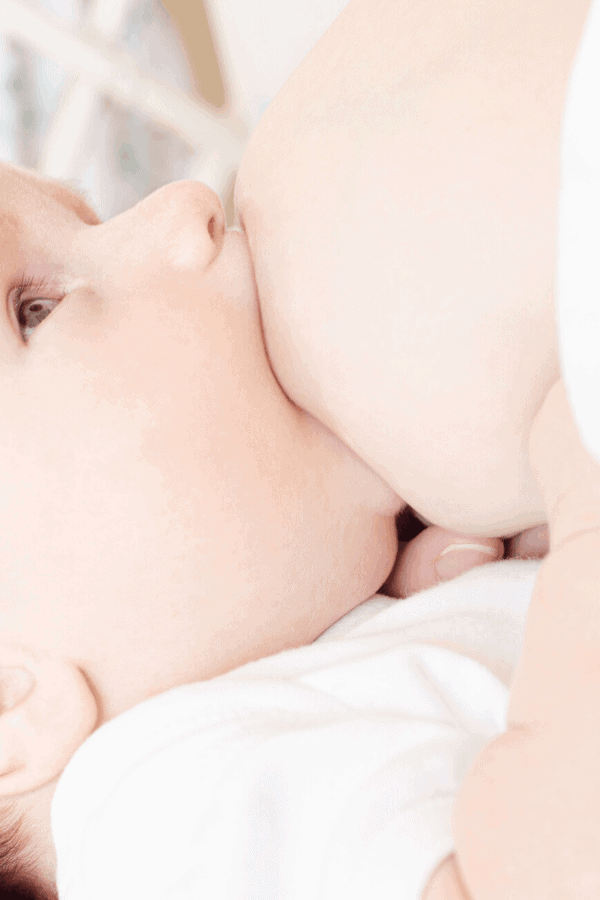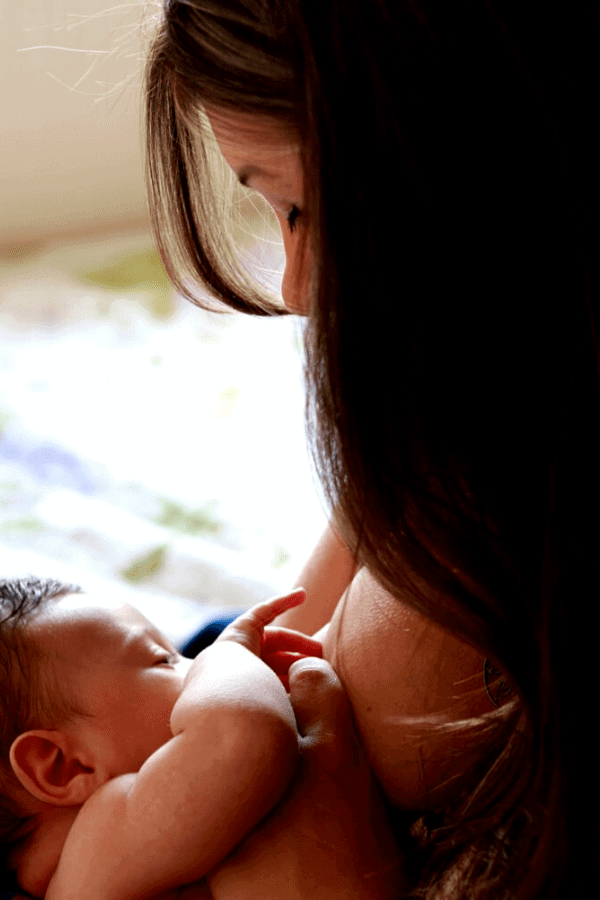There are a few reasons why you may experience body odor while breastfeeding. When a mother breastfeeds, hormones come into play excreting pheromones to draw the baby in to feed. The accumulation of all these things is increased sweat and a more pungent or unusual odor or the baby’s saliva and any old breast milk which may have stained your clothes and soured without you realizing.

Breastfeeding is a beautiful and natural part of becoming a mother. For many first-time moms, it is an experience that can be rewarding and daunting in equal measure.
Of course, every mom is different and adapts to breastfeeding at their own pace. When you do get started, however, you will experience new sensations and physical reactions.
These different experiences can vary greatly from mother to mother. However, one very common side effect of breastfeeding is a change in the smell and presence of body odor. This is nothing to be concerned about or embarrassed of, in fact, it’s perfectly normal.
It is important to remember that even the more unpleasant side effects of breastfeeding and motherhood are a part of mother nature’s beautiful overall plan.
Even the most seemingly needless annoyance, such as body odor, has maternal reasons at its source (keep reading to find out what this reason is!).
I will explore exactly why women experience increased body odor while breastfeeding by explaining its cause, as well as looking at natural solutions for managing any overly strong smell or odor.
Related: 10 Breastfeeding Hacks for new moms
[adthrive-in-post-video-player video-id=”LEhTP55n” upload-date=”2022-03-18T13:40:29.000Z” name=”The truth about Body Odor while Breastfeeding.” description=”” player-type=”collapse” override-embed=”false”]
Increased body odor while breastfeeding
While the smell of your increased body odor while breastfeeding may seem like a pain, rest assured there are genuine evolutionary reasons why this happens.
As your midwife may have told you when you gave birth, newborn babies have very limited hearing and eyesight. They are, in many ways, cocooned to the world around them.
However, their sense of smell is actually very developed. This is one reason that your increased body odor during pregnancy and breastfeeding is actually beneficial to your baby.
It helps them recognize your presence. They are likely to turn towards your smell, which will generally originate from your armpits and chest – this also has a beneficial evolutionary function as it turns the baby’s head towards your breasts and can help to encourage them to feed.
Of course, this isn’t to say you should avoid washing for fear of removing the smell or confusing your baby. But it is helpful to understand that this change in body odor does have its origins in logic – mother nature is very smart, after all!
Rest assured that this is a completely normal part of breastfeeding and motherhood. If you’re feeling self-conscious, then it is worth remembering that you will be experiencing a heightened sense of smell post-birth (just like your baby does).
It may seem that you smell strongly and that everyone around you can surely detect the odor, too. But so long as you are clean and practicing good hygiene, you are probably the only person who can actually detect your own personal body odor.
Plus, it’s also worth remembering that there are actually some other reasons you may not have thought of which have lead to the increase in body odor during breastfeeding.
Not all of these are directly related to the act of breastfeeding itself. For example, almost every woman comes out of pregnancy heavier and carrying some extra weight.

Related: MILKOLOGY: The Most Affordable Online Breastfeeding Class
While you will, of course, lose these extra pounds in time – extra fat equals increased insulation. Hence, you’re more likely to be warm and more likely to sweat as a consequence.
You can try and limit this cause of increased body odor and sweat by keeping yourself at a comfortable temperature. Wear clothes that are appropriate for the weather, and even invest in a fan or air-con if your home is inclined to overheat.
Body odor while breastfeeding medical explanation
Now you understand why your body is producing more body odor from an evolutionary perspective, it’s time to get your head around the medical reasons for this increase in body odor. After all, there’s a science to everything – even sweat!
Body odor is the smell given off via perspiration. This sweat is caused by the breakdown of fatty excretions in the apocrine glands located around the nipples and areolas, and of course, the armpits.
Naturally, you sweat before having children too. But going through pregnancy and post-birth, a woman’s hormones change drastically.

When a mother breastfeeds, even more hormones come into play and so she excretes pheromones to draw her baby in to feed. The accumulation of all these things is increased sweat and a more pungent or unusual odor.
There may also be other related issues causing an increase in unpleasant smells, for example, the infant’s saliva and any breast milk which may have stained your clothes and soured without you realizing.
Related: Thinking of doing Keto and Breastfeeding? Here is your Ultimate Guide.
Bathing regularly and washing with lemon water can help mothers struggling with this phenomenon to feel cleaner and fresh-smelling on a daily basis.
Doing this is as much for your own peace of mind as anything else, as discussed before, women experiencing these hormone changes also have a heightened sense of smell, too. So the odor might not be as strong as it seems!
Milk of magnesia for body odor while breastfeeding
One of the reasons body odor while breastfeeding raises concern in mothers is because of the potential issues connected with using normal deodorant.
This may also be something you encountered during your pregnancy. Some people believe the harsh chemicals and fragrances used in deodorants may impact your baby, or, get into the breast milk while you are feeding.
While this is still a topic of debate, most moms would rather be safe than sorry. Not to mention that overly strong fragrances should be avoided while breastfeeding as they may confuse your baby and even put them off feeding.
Instead, you should seek a natural and fragrance-free alternative. Studies have found no connections between the use of magnesium hydroxide and any adverse effects on breastmilk or breastfeeding infants.
Related: How to Increase Breast Milk Supply in 48 hours

So, products related to magnesium are generally a good option for combating body odor when breastfeeding, this is good news as one common and natural way of combating perspiration is to use milk of magnesia.
Many people, (not just mothers!) have talked about the incredible effects of milk of magnesia. It is incredibly good at helping to conceal and remove the smell of body odor, including the more unusual smells mothers sometimes encounter while breastfeeding.
The biggest issue people generally experience is finding a practical way to apply what can be a messy substance. Pouring the milk onto your hands and dabbing it under your arms probably isn’t the best option!
Instead, you could try soaking cotton balls in the milk and then dabbing them on any affected areas (such under your arms). The best option is probably to allow some of the water to evaporate so that it’s more of a paste when you apply it to any odorous areas.
Of course, as with any product such as this, you should carefully read the ingredient list before applying it to your body to ensure you don’t have any allergies relating to the substances within the product.
Related: Learn how to Exclusively Breast Pump like a Pro in Just 90 Minutes

Upper chest body odor while breastfeeding
You may notice when breastfeeding that the smell seems to be coming from your entire chest area, not just your armpits as you’d usually expect.
At first, this can seem off-putting or unusual as many women are not used to the smell of perspiration coming from the whole of their upper chest (rather than just the armpits which is more typical).
This may partially be due to the fact that your nipples and areolas also have apocrine glands meaning the increased pheromones may be present in your sweat excreting from these areas, too.
This causes the smell to come not just from your underarms but from your breasts, too.
However, this smell may also relate to the breast milk itself. Sometimes there is an excess presence of lipase in your milk; lipase is an enzyme that appears in breast milk as it helps to break down fats and keep the milk mixed.
However, when in excess, lipase can lead to a sour or soapy smell around your breasts. If this is the case, the surplus of this enzyme will usually pass with time as it is self-regulating.
Rest assured that this slight change in smell and taste isn’t harmful to your baby, and you should be able to manage the odor by keeping clean and breastfeeding regularly.
Related: The Best Pacifiers for Breastfed Babies 2020

To conclude
New moms have so much to worry about, body odor can seem like another hassle to add to the long list.
The important thing to remember is that this increase in body odor is perfectly natural – plus, breastfeeding women have an incredible sense of smell! So, it probably smells twice as strong to you as it does to everyone else.
Keeping up good hygiene and changing clothes regularly is definitely very important when it comes to avoiding a build-up of unpleasant odors.
Plus, don’t forget to try milk of magnesia as a natural and highly effective deodorant during this period. You can apply it with soaked cotton wool or in any other way that works best for you.
Remember, it does not absorb into the skin – instead, it works as an organic deodorant by counteracting the smell caused by bacteria in your sweat. So, you can spend less time worrying about body odor and more time focusing on your baby.
All in all, breastfeeding – while it has its stressful moments – is an incredibly important bonding period for mother and child.
Try and treasure every moment, even the more difficult points – for one day you will look back very fondly at this time.
There is truly no greater honor than being a mother and discovering the natural power of your body and the way it provides for your infant.
Whenever issues relating to body odor play on your mind, just try and remember it is your body’s natural way of guiding your baby to you – so that they know they are safe and protected in their mother’s arms.
